Eating
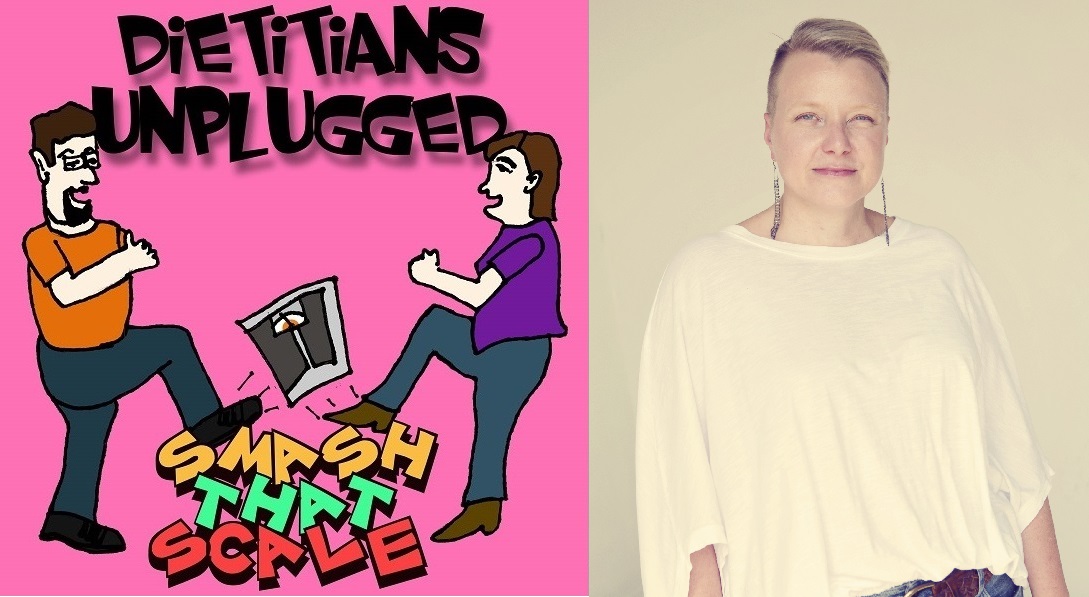
Brene Brown, Geneen Roth, Glennon Doyle, Oprah — women who want to empower us, all of them. That’s the message we’ve gotten, certainly, and many of us have felt the empowering effects of these women’s words on our lives.
But some of them haven’t gotten the message lately that worrying about weight loss or going on restrictive diets aren’t exactly empowering — or effective for that matter.
So when our friend Dana Sturtevant, MS, RD from Portland, OR’s Be Nourished sent a wonderful video rant to their Body Trust Network members about this very topic (among others), we knew we had to get her on the podcast and talk more about this and, like, everything else. Yoga, self-empowerment gurus promoting diet culture, social justice, true self-care, and how Dana found her way into the non-diet way of practicing are all here.
Listen here:
Subscribe and get my free guide:
Why you overeat …and what to do about it
Click here if you just want my newsletter!
Eating
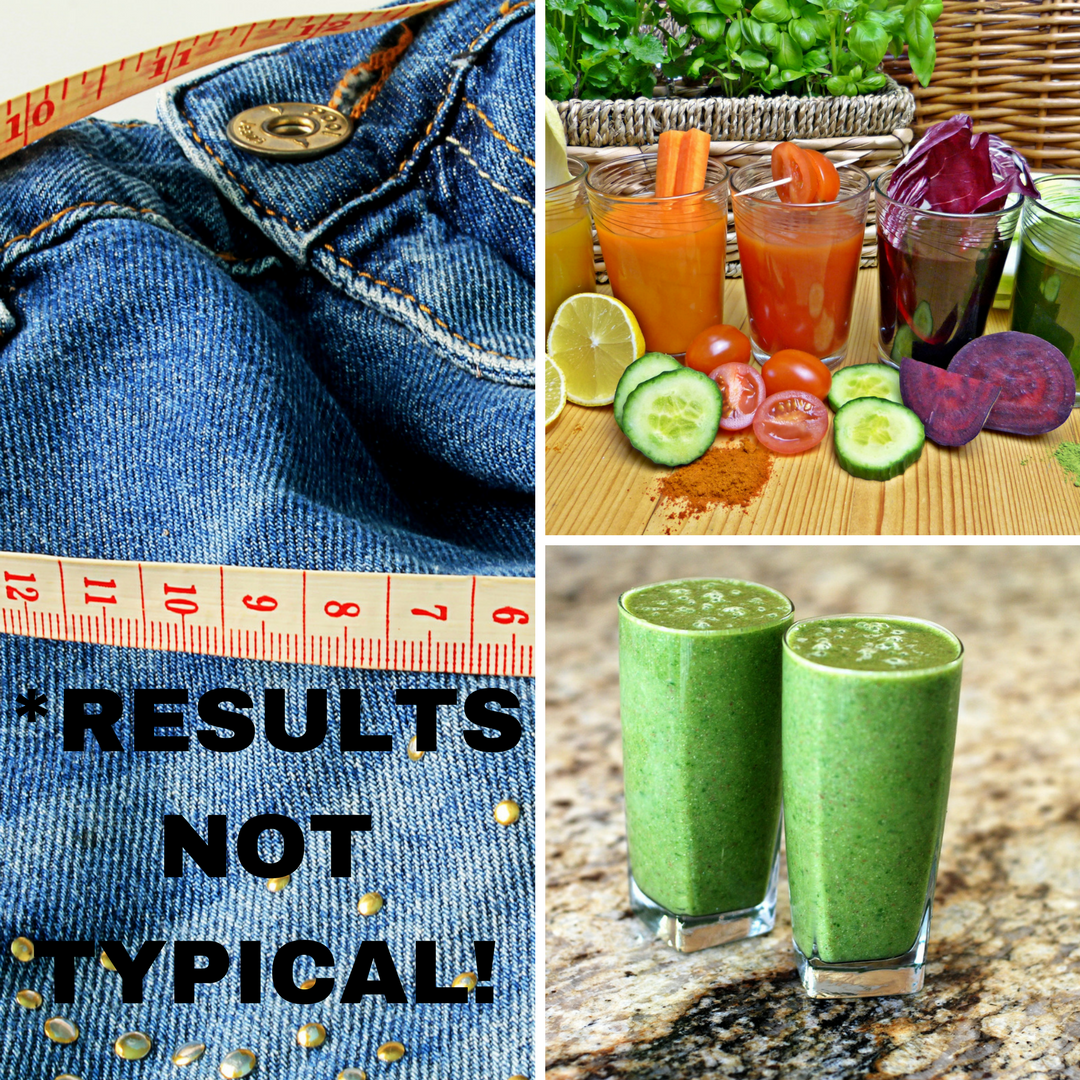
Have you ever wondered about that little fine-print disclaimer you see on literally every ad for a diet or weight loss program? “*Results not typical.”
I remember seeing that when I first became interested in, then joined, Weight Watchers. They would put it at the bottom of all those enticing before-and-after photos that I would later become so addicted to. At the time, I didn’t really understand that that meant: *Results not typical.
I thought maybe it meant that some people would lose varying degrees of weight but it was impossible to know how much weight someone would lose. It never occurred to me that it might mean that some people would not lose very much weight at all, or that most people would gain most of their weight back (or more) within a few years.
No, I absolutely did not think it meant that.
And because I lost the weight I wanted to, I conveniently forgot that little disclaimer and went around thinking, “If I can do it, anyone can!” And that’s what the diet companies really want you to think, and why they show those before-and-after photos as proof* of their effectiveness.
Why do weight loss companies have to display that little fine-print disclaimer on all their ads? Because more than 30 years ago, the FTC figured out that their diet shit doesn’t work for most people. But rather than stopping the sales of snake oil (which, admittedly, might be difficult to do), they forced the snake oil companies to put this little disclaimer on all their ads selling their outrageously ineffective products.
Sigh.
But at least they did that, and they keep trying to crack down. They could do a better job, like demand much more rigorous, long-term evidence that any diet product or service works long-term for more than a tiny fraction of people. If they did that, we’d never see another diet company ad again.
So when you see *Results not typical anywhere, just remember what it really means. It means someone wants to sell you some high protein/low fat/low carb/low taste snake oil that most likely won’t make you thin in the long run simply because it’s not the typical result.
*This is not good proof
Subscribe and get my free guide:
Why you overeat …and what to do about it.
Click here if you just want my newsletter!
Eating
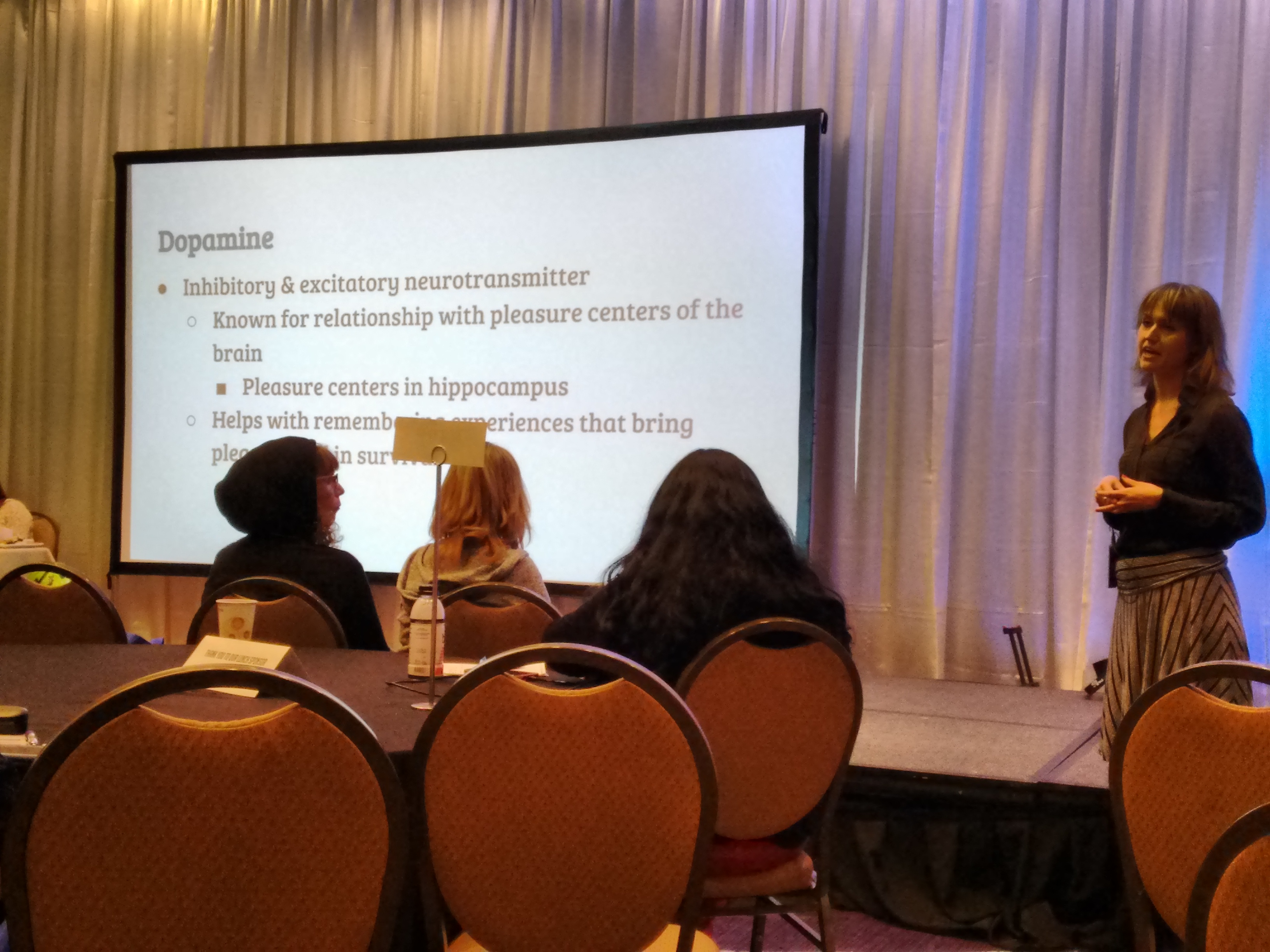
Tiffany giving her awesome talk to a curious audience.
I keep trying to write a blog post about how I ended up going to the Obesity Help National Conference to watch my new friend Tiffany Haug’s presentation on sugar addiction (and how that’s not really a thing)…
And I can’t get it to come out right, because it was such a strange experience of many mixed emotions.
So here’s the raw stuff:
It was weird being there. I thought it would be mostly doctors and other health professionals trying to figure out how to make people lose weight. That seemed bad enough.
I didn’t know that, instead, it would be a lot of lay people – non-health professionals who just wanted information on how to lose weight forever, and especially a lot of higher weight people who were interested in bariatric surgery information (because this was, at its essence, a bariatric surgery conference. Many of the sponsors were bariatric surgery companies).
And it was such a strange experience to be there, because most of the time, both in person and online, I am with people who don’t talk about weight loss, who have rejected dieting as a way of life, or who have never dieted and never will diet. I hear the other voices at a distance, and can tune them out easily.
But that world is a bubble.
When I stepped out of my bubble and into the belly of the beast, as Tiffany so adroitly termed it, I saw how I and all the other attendees were viewed as prey. Prey for the protein drink and air-food sellers, prey for weight loss surgery companies. There was a palpable sadness in the air, like everyone there looking for the latest news in sustainable weight loss knew that, in fact, no such thing exists for most people. But they were going to keep tyring anyway.
It was reminiscent of my years in Weight Watchers meetings, all filled with hope and despair in equal measure.
I wanted to reach out to every person there and say, “You’re fine just the way you are. You don’t need these companies. They only want to profit from the shame they hope you never lose. Let’s run away from this place now.”
But they weren’t there to hear me say that, and I wasn’t there to “save” everyone (something I have to remind myself of regularly). Most of these people would probably be shocked and horrified of my blithe use of the word “fat” as a non-judgmental body size descriptor. Fat, in this space, was something bad…something to be cured, no matter what the cost.
Instead I listened to Tiffany’s excellent talk, very excited to hear a dietitian present anti-diet ideas to this group that were probably quite novel for them. One person even thanked her for not giving the usual food-fear talk.
This is how seeds get planted – one stealth anti-diet talk at a time. I left with more hope than despair for the future.
PS – Thank you to Tiffany for getting me a complimentary ticket to her talk – I could not, in good conscience, have paid any money to this diet industry debacle. (and she didn’t get paid by them, either)
Subscribe and get my free guide
Why you overeat …and what to do about it
Click here if you just want my newsletter!
Eating

Last year, Aaron and I did a podcast on how much we hated the terrible, exploitative show The Biggest Loser. Some data had just come out about how participants metabolisms had all but flat-lined and stayed that way for years after their time on the show. For us, it was no surprise, but it was good to finally see some data supporting what we already knew (and what data from other studies also showed).
Imagine, then, how delighted we were when we heard that The Biggest Loser would NOT be returning this year for another round of fat-people abuse. We REALLY needed to celebrate this – and who better to celebrate with than a former contestant of the show?
Kai Hibbard was a season 3 contestant who came in second that year. Since then, she’s become an outspoken critic of the show and its tactics, a proponent for body positivity, and an all ’round riots-not-diets kind of sHero. When we contacted her to see if she’d like to come on our podcast and toast the end of this shit-show of shame, she was all in.
What followed was an honest exposé of her time on the show, how she developed extremely disordered eating during and after the show, her eventual recovery and transformation into a body positive warrior. Yes, there is lots and lots of swearing, too.
And while we have no doubt this is not truly the end of the exploitation of fat people for the profit of network TV, we think it was a nice little nail in the coffin. We need to celebrate every win against diet culture.
Listen on:
Want to feel freedom with food?
Tired of feeling ruled by food? I can help you get free. Learn more here.
Subscribe and get my free guide, Why you overeat …and what to do about it.
Click here if you just want my newsletter!
Eating
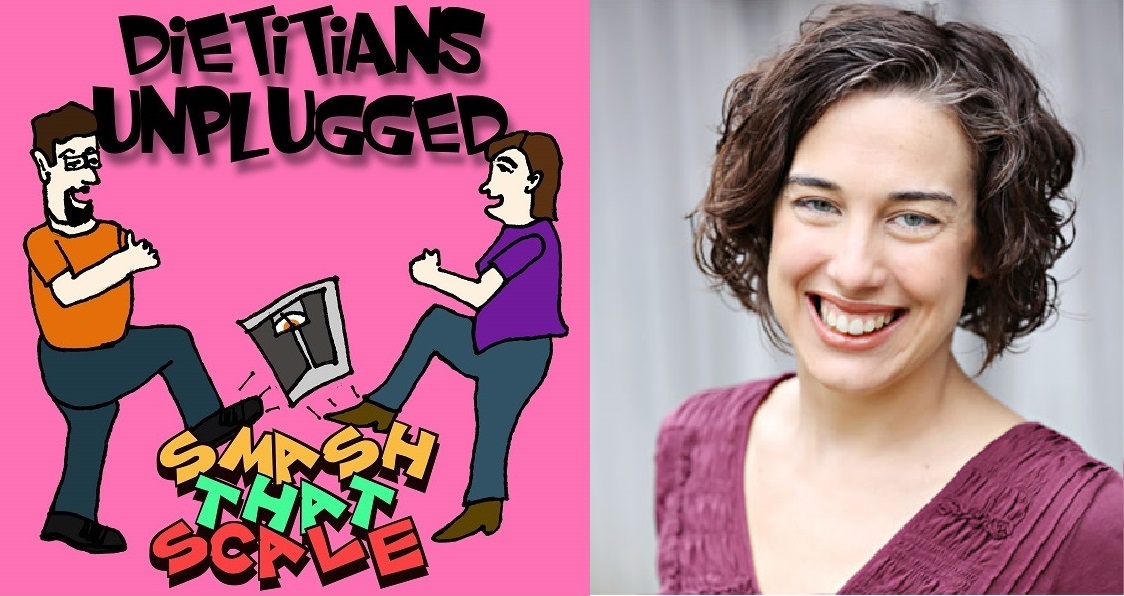
I’m amazed to say that before a few years ago, I had never heard of the condition Polycystic Ovarian Syndrome (PCOS for short). A friend in college had first mentioned that she thought she may have it, but couldn’t get a firm diagnosis.
Since then, I’ve met many more women who have PCOS – so many, in fact, that I have a hard time believing the statistic that 1 in 10 women have it. If I had to guess, it’s more than that – but the typically poor attention and research around many complex women’s medical conditions will probably hinder proper diagnosis and of course, appropriate treatment.
PCOS causes hormonal imbalances, can hinder fertility, may be related to unexplained weight gain, and is related to insulin resistance and diabetes. One of the common treatments suggested has been weight loss – and you know how a dietitian like me feels about that. Weight loss in absence of any medical condition is already difficult to achieve and nearly impossible to maintain. PCOS makes it even harder. And as we know, it is in all likelihood a temporary solution at best, with the most likely result being even more weight gained in the long run.
That’s why I’m so glad my wonderful colleague and fellow podcaster, registered dietitian Julie Duffy Dillon, is an expert in the area of PCOS. She’s on top of all the latest research. So, of course, I reached out and said, “Julie! Make sweet, beautiful podcast magic with us on this incredibly complex condition!” and happily she said yes without hesitation.
If you or someone you know struggles with PCOS and related weight gain or insulin resistance, I think you’ll find this episode of Dietitians Unplugged incredibly enlightening and reassuring. There are things you can do for your health and your fertility, but luckily, one of them isn’t suffering under the tyranny of yet another weight loss regimen.
Listen on:
Check out Julie’s excellent podcast, Love, Food and her free PCOS Roadmap.
Subscribe and get my free guide:
Why you overeat …and what to do about it
Click here if you just want my newsletter!
Eating
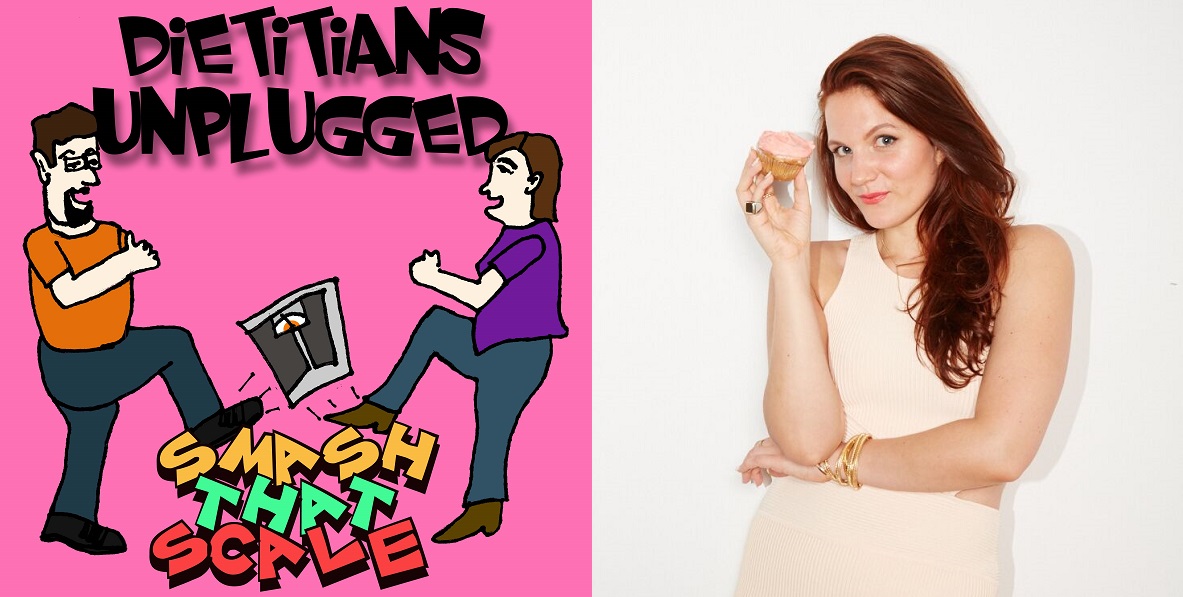
One of my big heroes in the anti-diet world is Isabel Foxen Duke. She is a bad-ass who doesn’t mince words when it comes to explaining why diet culture is bullshit, eating isn’t the addiction, and why emotional eating might be saving your ass. So when we got to meet over the phone a while back, of course I leaped at the chance to invite her on our podcast.
In this awesome episode of Dietitians Unplugged, Isabel, Aaron and I talk about all stuff anti-diet, intuitive eating, Health at Every Size and yes, even sex (don’t worry, the episode is still by and large PG!).
More About Isabel
Isabel Foxen Duke is the Creator of Stop Fighting Food—a free video training program for women who want to “stop feeling crazy around food.” After years of trying to overcome emotional eating, binge-eating and chronic weight-cycling through traditional and alternative approaches, Isabel discovered some radical new ways to get women over their “food issues” once and for all—not just by shifting the mindsets of individuals, but by challenging the dominant diet culture as a whole.
Listen now:
Learn more about Isabel’s free Stop Fighting Food video series now!
Sign up now for the 2017 Fat Activism Conference!
The 2017 Fat Activism Conference is happening live online October 6-8, with recordings and transcripts available after! Click here to find out more.
Subscribe and get my free guide:
Why you overeat …and what to do about it
Click here if you just want my newsletter!
Eating
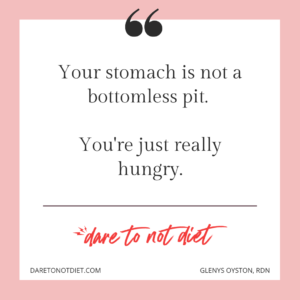
As a dietitian who helps others get over disordered eating after years of dieting, I’ve heard this many times: “I don’t have a limit when I’m eating. If I let myself eat what I want, I won’t ever be able to stop eating.”
To this I say: bunk. It just feels like that.
Everyone has a stopping point*. You might not think so because maybe you’ve stood beside the cheese tray at a cocktail party scarfing ungodly amounts of mediocre cheese cubes fearing you’d never stop. Maybe you stopped at bursting and that felt bad. And maybe you simply don’t know your stopping point because you are hungry much of the time…so very, very hungry.
Here’s a little secret
Dieting and calorie and food restriction create a false impression in your body that you are a bottomless pit. That you are a vessel that will never be filled, especially when you are confronted by a favorite or particularly delicious (or sometimes even mediocre) food. Maintaining a body weight lower than what is natural for you will also cause your body to constantly crave food, large amounts of it. Anyone who diets will likely experience this biological response regulated by a cascade of hunger hormones.
On the flip side, honoring your appetite (aka, eating intuitively) has the opposite effect. Once you begin to eat satisfying amounts of food when you feel hungry and your body weight adjusts toward its natural set point, your bottomless pit starts to find its bottom. As you practice honoring internal cues more often, you may start to find that your stopping point is not, in fact, stuffed but satisfied. You may even find yourself easily leaving food on the plate, or turning down the offer of a homemade brownie if you are simply not hungry for it.
You do have a stopping point
My bottomless-pit acquaintances are incredulous when I suggest that they do have stopping points. They don’t trust their bodies. Most are desperate to stay thin and know their natural appetite will support their desired size.
I understand why people pursue this path. But if constant cravings have taken over your life and preventing you from fully living, it could be time to give up the dieting.
When you truly honor your internal signals of hunger and satisfaction, eating what I really want, and letting your body be, you will no longer have fearsome, insatiable cravings. Honoring your appetite comes from a place of body respect and is an act of self-care.
Eating what you want and as much as you want may feel scary at first. As your body adjusts, that fear may turn to comfort as you realize you are taking care of yourself and your needs and you no longer have to fear your own bottomless pit.
*Some medical conditions excepted.
Start your path to normal eating with my free guide, 5 Strategies to Stop Overeating
Eating
One of the most common reactions to what I write about learning to accept our bodies at the weight they are and taking a non-diet approach is, “But I’m not at the weight I’m supposed to be…I should be XXX pounds because that’s what I was [when I was my healthiest weight; when I was an athlete in college; before I had three kids; before I developed this knee condition; when I ran marathons all the time].”
I totally get it. Lots of us have that utopian time in our lives when our weight was perfect (or so we think in hindsight), our health was optimal, and we were going to live forever…and we so desperately want to get back to it.
Even when, intellectually, we know that dieting doesn’t work, that weight loss is typically short-term (<3 years) at best, that even when our own personal experiences tell us that previous weights were not sustainable, we resist in accepting this. I recently read a great term for this: data resistance, meaning no matter how clear the science is on this topic, people still want to believe that long-term weight loss is possible for more than a tiny fraction of people. The propensity for magical thinking is strong in us humans, and weight is no exception.
Let’s roll with it, then. Maybe you aren’t at your optimal weight. Do you want to diet to try to get there? Is that something that has been sustainable for you in the past? If not, why do you think things would be different this time? What happens if, despite all your efforts, you never get anywhere close to your desired weight? How do you live your life then? What happens if the weight you are now is your weight for the rest of your life? I think it’s worth it to have this conversation with yourself, so you at least have some options.
There are also important things to know before you decide what to do next. First of all, despite what we have been told ad nauseam by the diet industry, your weight is not really within your control, at least in the long term. If you’ve been reading this blog for a while, you are well aware by now that intentional weight loss has a 90-95% failure rate over the long haul (>5 years).
Your weight is really determined by a combination of your genetics, your metabolism, and your environment (past and present) – and not so much by the weight you actually want to be. Do you have fat parents or family members (genetics)? Have you spent any part of your life restricting calories or foods (environment)? And if so, did you know that your metabolism is probably running slower than if you hadn’t (metabolism, obviously)? Possibly most significantly, if you have made multiple weight loss attempts throughout your life or were put on diets as a child, your natural set point will be higher than what it might have been had this never happened. Unfortunately, we’ve all been fed the calories in/calories out bullshit, and have been taught that calories out are totally within our control, when in reality our sneaky metabolism comes along and adjusts everything to make sure we aren’t spending too much energy, because Lord knows the body loves homeostasis.
So now you’re well-armed with information about the spectacular failure of long-term weight manipulation. That’s all well and dandy, you think, but maybe I’ll be one of the 5% who keep the weight off. Maybe you will be! I was for a long while – before The Diet Monster took over my life and made me more miserable than I had ever been as a fat person. It’s a dicey gamble to make – you might be one of the 5% who manages to maintain long-term weight loss by making it your life’s work, OR you might be one of the 95% who gains some, all, or even more of your weight back, leaving you even fatter than you started. In the words of Dirty Harry, “You gotta ask yourself, ‘Do I feel lucky?” Well, do ya??
“But I’m simply not healthy at this weight.” Hey, you might not be. I don’t know your particular health habits or your lab values. Just remember, though, that weight is not a health behavior; it’s a size. This is not to say that everyone is healthy at whatever weight they’re at; it simply means that whatever weight you are right now, you can start to work toward better health. So maybe your health isn’t great right now – is losing weight truly the only way you can improve your health? What about improving your eating habits or activity level? If you consider yourself too large to exercise, check out The Fat Chick’s webpage for activity for people of all sizes. Plenty of studies show that fitness is a better determinant of health than fatness and recently even more are showing that weight loss in some populations is associated with greater mortality rates.
“Well, I’m just not comfortable at this size.” I understand; moving in a thin body is different than moving in a fat body. While I personally don’t notice all that much difference (I’m lazy at both ends of the weight spectrum!), I also recognize that my weight difference might not be as great as someone else’s and that my experience is not universal (I also developed osteoarthritis in my feet at my thinnest, so even that wasn’t a guard against joint problems). Whether your discomfort is physical or psychological, how much do you think our culture’s prevailing attitudes about weight are influencing your discomfort with your weight?
I used to feel like I had to suck in my stomach, no matter what weight I was. As I regained weight, my stomach was beyond sucking in – I could tighten those ab muscles all I wanted, but that layer of fat wasn’t going anywhere. Sucking in made me feel physically uncomfortable. Not sucking in made me feel psychologically uncomfortable. I felt out of proportion, and I felt like I was being outed by my tummy as a fat person. When I finally acknowledged that how I felt about my stomach had more to do with how the world views fat people and less to do with how I actually felt, I eased up on my expectations of my body. If your feelings of discomfort are 100% physical, consider a non-diet approach in which you could find activities that you are comfortable doing right now, and work your way up from there. Bodies are amazingly adaptable, especially when we are being kind to them.
I wish I could tell you that our desires controlled our weight. That it’s just a matter of trying really hard and you’ll have some satisfying weight loss that lasts forever without totally ruining the quality of your life. My own personal experience, the experiences of all the other people I’ve met in the fatosphere, and the bulk of available science on the subject does not permit me to do so. I can only recommend a kinder approach in which you let your body decide what it will weigh – it will do that eventually anyway – while you find your own way of living as healthfully as you want and can. That will give you a stable weight that is right for you. Because, with this one life you have, how long do you really want to struggle against your body?
Subscribe and get my free guide:
Why you overeat …and what to do about it
Click here if you just want my newsletter!
Eating
Taylor Wolfram, MS, RDN, LDN is a non-diet dietitian who, like me, teaches others to ditch restrictive diets and learn to eat intuitively. But unlike me, she is a wealth of knowledge when it comes to veganism. She suggested we swap blog posts, and since the topic of remaining vegetarian or vegan during ED recovery has come up a few times in the online spaces where I hang out, I thought we could all learn something from her approach. Enjoy! -Glenys
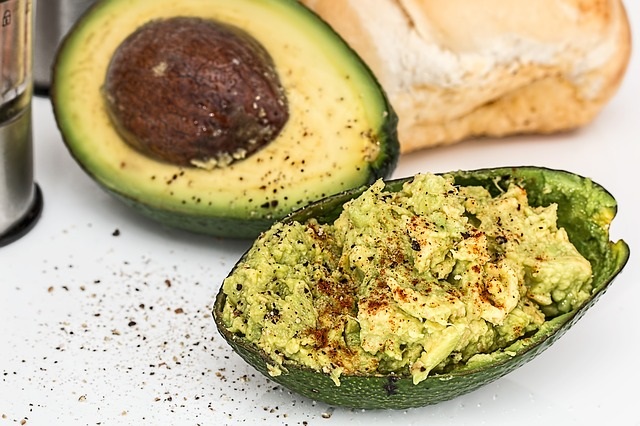
A vegan diet MUST include fat!
Hello, Dare to Not Diet readers! I am so delighted to swap guest posts with Glenys. The community of non-diet dietitians is growing and the more we can spread positive messages about food and bodies, the better! My areas of expertise include vegan nutrition as well as a non-diet approach to sustainable wellness. I help clients focus less on weight and body size and more on enjoyable lifestyle behaviors that help them feel happy and healthy. I’ve been vegan for 8 years and have been counseling vegan (and non-vegan) clients for nearly 4 years.
Unfortunately, some people wrongly assume that veganism equates to restrictive eating. I’m here to show you that veganism is about compassion, not about restriction, and that it is possible to eat intuitively without eating animals or their byproducts. It also is possible to recover from disordered eating and eating disorders while vegan. Did you know vegans who do not eat animals for ethical reasons are no more likely to have eating disorders than non-vegans? While some people with eating disorders may abstain from eating animal products as a method of restriction, veganism is not automatically a precursor for eating disorders.
To bring you feasible and effective strategies for maintaining veganism while recovering from an eating disorder, I interviewed Caitlin Martin-Wagar, MA, an eating disorder researcher and clinician who also happens to be vegan. She holds a master’s degree in clinical psychology and also is a doctoral student in Counseling Psychology at The University of Akron.
Be honest with yourself. When I first meet with vegan clients, I ask them about their journey to becoming vegan and their motivations for doing so. This helps me understand potential restrictive mindsets and also helps clients self-reflect on their own behaviors. “Make a list with two columns: one with the ethical reasons you are vegan and one with potentially eating disordered reasons you are vegan (if there are any). If you discover there are eating disordered reasons for your veganism, find ways to challenge those reasons and refocus on the ethical reasons you are vegan if you want to maintain a vegan lifestyle. For example, you can make sure you are including a wide variety of foods in your diet, including the vegan versions of non-vegan foods, like macaroni and cheese, pizza, and cupcakes,” Caitlin advises.
Have a plan. Eating disorder or not, having a general plan for eating, especially when traveling or attending events when you aren’t certain about food availability, is one of my key tips for vegan clients. Figure out your favorite packable snacks and keep them in your bag, car, desk, etc. so you don’t find yourself without food when you’re hungry. Caitlin says, “For people not in recovery, going a few extra hours without food because of a lack of availability won’t necessarily impact them psychologically. But for vegans recovering from eating disorders, accidental restriction can trigger eating disorder urges like bingeing, purging and further restriction.”
Challenge restrictive thoughts. I like to ask my clients about their favorite vegan foods and where they can get them. This helps them realize how many options they have. I also like to see if there are any foods clients may be restricting for whatever reason, such as oils, desserts and plant-based meats and cheeses. “If you notice restriction urges are triggered from not having certain foods that are not included in vegan lifestyles, remind yourself that you are not excluding these foods due to eating disordered reasons. Challenge these thoughts and show yourself you are willing to have high-fat vegan foods at times—this can help squash any concerns that you are restricting for eating disordered reasons,” Caitlin advises.
One more thing to consider: work toward becoming more accepting of diverse body shapes. Both Caitlin and I are passionate about challenging myths related to body size and health conditions in the vegan community. Having weight stigma or an attitude of health elitism is not only damaging, it strays from the compassionate core of what veganism is all about.
If you’re struggling with an eating disorder or need support through eating disorder recovery, please work with a therapist and eating disorder dietitian. Everyone’s journey is different and no blog post can substitute for individualized therapy and guidance.
You can find Taylor at taylorwolfram.com.
Subscribe and get my free guide:
Why you overeat …and what to do about it
Click here if you just want my newsletter!